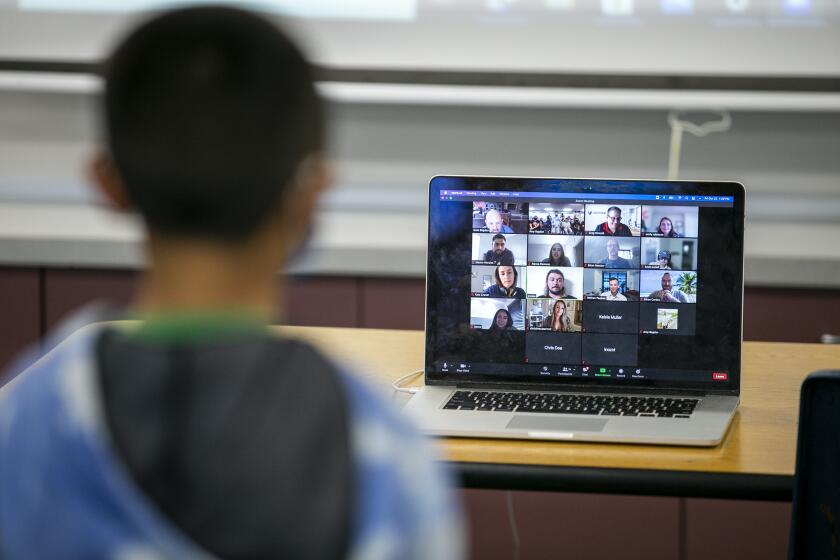Apodaca: With its extreme need for energy, AI presents strong environmental challenges

- Share via
In my last column I touched on the impact that artificial intelligence, or AI, is having on education, and the profound challenges and opportunities that lie ahead in that arena.
Of course, AI is a huge topic, and there is so much more surrounding this technological leap that requires analysis and discussion. After all, we are continually told that AI is going to “change everything.” Such pronouncements send chills up my spine, even as I struggle to understand on the most elemental level what they actually mean.
But, ready or not, and despite our fears, we are running headlong toward our AI-enabled future.
One thing we know for sure is that AI will consume massive amounts of energy at the same time that we’re trying — some of us, anyway — to rethink our energy consumption and transition to renewables. One analysis estimated that data center energy needs would more than double by the end of the decade; another put the increase at 160% in the same period.
That’s why big corporations are locating huge data centers in largely rural areas where land is cheaper, untapped power sources are available and the regulatory environments are friendlier.
These corporate interests have big plans. Take, for example, the news that surfaced recently that tech giant Microsoft intends to restart the Three Mile Island nuclear power plant — yes, that Three Mile Island — to power its data centers.
The move was portrayed as a way to utilize carbon-free energy. Indeed, nuclear power is undergoing a renaissance as it benefits from an image makeover as a climate-friendly energy alternative.
But is anyone else just a teensy bit nervous about this voracious appetite for energy intended to fuel a technological tsunami? Experts are warning that even the nuclear power that’s available won’t be enough, and that all these data centers will also spur enormous demand for natural gas — which is certainly not a renewable, climate-friendly alternative.
That’s not the only way these companies are likely to trash their stated sustainability goals. The data centers will also gulp enormous amounts of water required for cooling. And that’s not even counting the water that will be used for all their additional energy demands.
Where will this water come from on our increasingly thirsty planet? It’s an important question that lacks anything close to a good answer.
Turning from the environmental impacts of AI, I also worry about other potential costs.
Artificial intelligence presents opportunities and challenges, particularly in education, writes Daily Pilot columnist Patrice Apodaca.
Maybe I’m naive. Or paranoid. Or both. Nonetheless, I know I’m not the only one who is concerned about the impact AI might have on our essential humanness.
We already know about the negative effects that stem from people spending an increasing amount of their lives online: Kids’ brains’ warped by social media. Interpersonal communications reduced to bits and bytes. The proliferation of misinformation and disinformation. Growing divisiveness.
Too many of us are distracted and lonely, sleep-deprived and image-obsessed. Students can barely focus in class, which is why Gov. Gavin Newsom just signed a new law that will require schools to restrict the use of smartphones by July 2026, and some districts like Newport-Mesa Unified have already instituted cellphone bans.
Meanwhile, some valued institutions might struggle to fit into our shiny new world of AI.
Libraries are a prime example. For the most part, public libraries have done an admirable job of evolving and managing to survive the advent of mass communications and the internet.
But it’s a constant battle, one that’s been further complicated as they’ve come under siege by the book-banning crowd. We need look no further than the Huntington Beach City Council’s efforts to impose an extreme ideology on the city’s cherished library system to understand the pressure that libraries are under.
Now a new challenge has appeared, and it’s fair to wonder if AI will at last render public libraries obsolete. Some experts say no, and that AI can be used to help libraries operate more efficiently; again, it’s seen as a matter of adapting to the times. And yet, will something be lost — the human element, that essential ingredient that makes libraries more than just repositories of information and instead vital community hubs?
Consider another community staple—the local YMCA. I recently had a long conversation with two executives at YMCA in Orange County, who talked about the many ways that organization, with roots dating back 180 years, is constantly looking for new opportunities to provide the kinds of services their members need.
They spoke at length about “the bond we’re creating and bridges we’re building with this community.”
A great deal of interpersonal connectedness has fizzled out in recent years, they said, so they focus their efforts on programs and activities that bring the community together because they’re convinced that is still what people crave.
It’s an appealing message. I wonder if it will continue to resonate as we venture into the unknown.
AI is poised to change everything. That’s what we keep hearing, and I don’t doubt it. Maybe those changes will make our lives better in many ways, but we need to be aware of the potential costs — to the environment we rely on to survive, and to those qualities that keep we humans in touch with what it means to be human.
All the latest on Orange County from Orange County.
Get our free TimesOC newsletter.
You may occasionally receive promotional content from the Daily Pilot.





